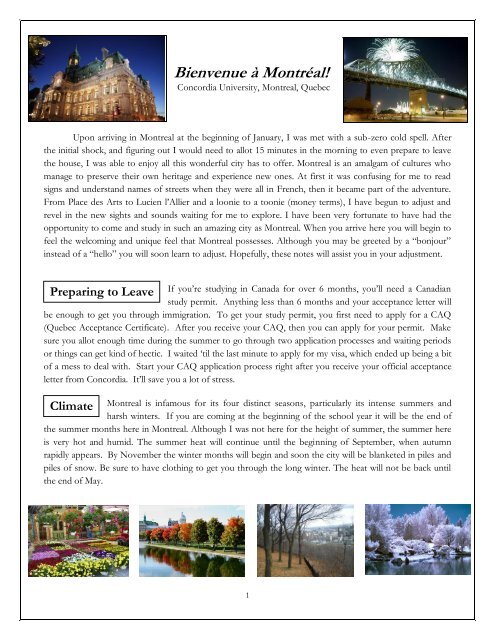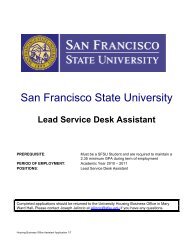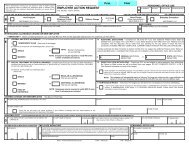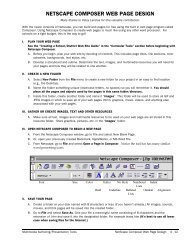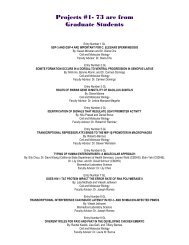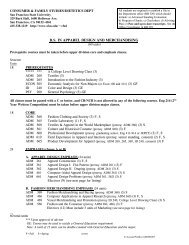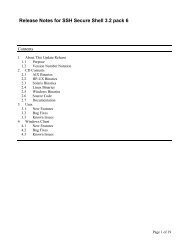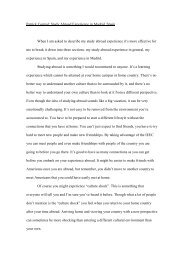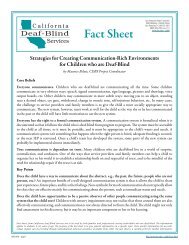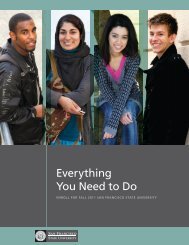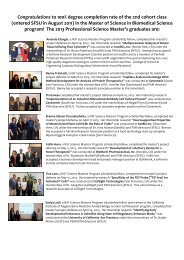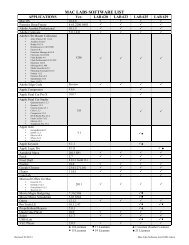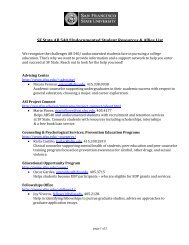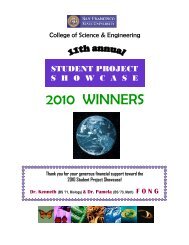CANADA - San Francisco State University
CANADA - San Francisco State University
CANADA - San Francisco State University
You also want an ePaper? Increase the reach of your titles
YUMPU automatically turns print PDFs into web optimized ePapers that Google loves.
Bienvenue à Montréal!<br />
Concordia <strong>University</strong>, Montreal, Quebec<br />
Upon arriving in Montreal at the beginning of January, I was met with a sub-zero cold spell. After<br />
the initial shock, and figuring out I would need to allot 15 minutes in the morning to even prepare to leave<br />
the house, I was able to enjoy all this wonderful city has to offer. Montreal is an amalgam of cultures who<br />
manage to preserve their own heritage and experience new ones. At first it was confusing for me to read<br />
signs and understand names of streets when they were all in French, then it became part of the adventure.<br />
From Place des Arts to Lucien l‟Allier and a loonie to a toonie (money terms), I have begun to adjust and<br />
revel in the new sights and sounds waiting for me to explore. I have been very fortunate to have had the<br />
opportunity to come and study in such an amazing city as Montreal. When you arrive here you will begin to<br />
feel the welcoming and unique feel that Montreal possesses. Although you may be greeted by a “bonjour”<br />
instead of a “hello” you will soon learn to adjust. Hopefully, these notes will assist you in your adjustment.<br />
Preparing to Leave<br />
If you‟re studying in Canada for over 6 months, you‟ll need a Canadian<br />
study permit. Anything less than 6 months and your acceptance letter will<br />
be enough to get you through immigration. To get your study permit, you first need to apply for a CAQ<br />
(Quebec Acceptance Certificate). After you receive your CAQ, then you can apply for your permit. Make<br />
sure you allot enough time during the summer to go through two application processes and waiting periods<br />
or things can get kind of hectic. I waited „til the last minute to apply for my visa, which ended up being a bit<br />
of a mess to deal with. Start your CAQ application process right after you receive your official acceptance<br />
letter from Concordia. It‟ll save you a lot of stress.<br />
Climate<br />
Montreal is infamous for its four distinct seasons, particularly its intense summers and<br />
harsh winters. If you are coming at the beginning of the school year it will be the end of<br />
the summer months here in Montreal. Although I was not here for the height of summer, the summer here<br />
is very hot and humid. The summer heat will continue until the beginning of September, when autumn<br />
rapidly appears. By November the winter months will begin and soon the city will be blanketed in piles and<br />
piles of snow. Be sure to have clothing to get you through the long winter. The heat will not be back until<br />
the end of May.<br />
1
Packing<br />
If you‟re going for either fall or winter semester, you‟re going to experience snow no<br />
matter what. You should have a warm coat that is lined, a long scarf, long underwear,<br />
warm hat and gloves, waterproof shoes and warm socks. You may be better off purchasing your winter<br />
apparel in Montreal because the California gear often isn‟t made for the type of winter you will experience<br />
here. The most important thing is to dress so you can stay dry and warm during the many weeks of<br />
whiteness.<br />
Arrival<br />
At the Airport: After going through customs you will have to go to the immigration area and<br />
if you staying for less than six months you will need to bring your acceptance letter from the<br />
university and if you are staying longer than 6 months you will need to bring your CAQ and study permit. I<br />
actually picked up my study permit at airport immigration (although I applied for it a month in advance).<br />
The immigration officer will check over your documents and issue you your study permit and direct you to a<br />
secondary office for international exchange students. They‟ll hand you a packet of useful information about<br />
Montreal and your school and then you need to go to the baggage carousel. Do not exit through the double<br />
doors without your luggage because they will not let you back in once you exit. If you exit without your<br />
luggage you will have to call the airlines on the “black phones” and wait for them to bring your luggage. I<br />
made this mistake and trust me the two hour wait was not pleasant.<br />
At Concordia: Concordia will send you an information packet upon your acceptance into the program. The<br />
packet will include information on the orientation sessions that will be held through the International<br />
Student‟s Office (ISO). It is mandatory that you attend an orientation, so be sure to go to one of these<br />
information sessions as they will give you instructions and deadlines about paperwork you fill out. They will<br />
also give you information about all the services that Concordia offers such as health insurance. It‟s probably<br />
a good idea to take notes during your orientation.<br />
Health Insurance<br />
It is mandatory for all international students at Concordia to get the<br />
university‟s compulsory health care plan. When you see an advisor in the<br />
International Students Office they will give you the health plan card and your student account will be billed.<br />
It was around $600 CAD for coverage for two semesters (August to May) and around half that amount for<br />
one semester‟s coverage. You have no choice about the health plan even if you already have coverage in<br />
California, so plan on having the money to pay for it. You do not have to pay the money all at once but you<br />
can make payments on your student account when you do have the money. If you ever have to use your<br />
medical plan for medication or to go to a health clinic other than the school‟s health center, you will have to<br />
front the money and then fill out forms in the International Students Office for reimbursement.<br />
Money and Banking<br />
There are many banking options in Montreal. I choose to keep my<br />
account in California and also open an account at the Royal Bank of<br />
Canada. When you do use your account in California you may be charged a currency conversion fee which<br />
is dependent upon the amount of the purchase. I opened a US account and a Canadian account at the RBC.<br />
My parents would send me checks or money orders and I would put them in my US account and then<br />
transfer over as I needed to. Instead of debit cards with a Visa or MasterCard symbol on them they use<br />
Interac cards which are accepted everywhere. The banks here will hold checks from the US for a certain<br />
2
number of days depending on the amount. This is quite a hassle so if you can have your money transferred<br />
from the US or get cashier checks sent, it will save you a lot of hassle. The bank will exchange your money<br />
for you and give you the current rate. If possible though, try to have some Canadian money before you<br />
come or get it at the airport to hold you over for the first few days. The banks here are not open on the<br />
weekends and only 10-4 during the week. If you are looking for a convenient bank, Laurentian Bank is a<br />
very popular banking institution in Montreal. There are Laurentian ATMs at nearly every metro station and<br />
all around Concordia‟s downtown campus. Here are some great banking options:<br />
Housing<br />
I was lucky enough to have place lined up before I came to Montreal but if you don‟t it is<br />
quite easy to find a good place that is close to campus. The housing costs in Montreal are<br />
especially low in comparison to <strong>San</strong> <strong>Francisco</strong>. You can rent a three bedroom flat for the cost of a room in<br />
<strong>San</strong> <strong>Francisco</strong>. At the beginning of the semester, the International Students Office at Concordia offers<br />
housing workshops and they have vacancy numbers and contacts for people who are looking for<br />
roommates. Many international students I have talked to got their housing this way. When you first arrive<br />
you can either stay at a hostel or the YMCA in Montreal. Concordia also offers dorms and if you are quick<br />
on your feet you may be able to get into those. Yet finding a place on Craiglist or Kijiji is usually the fastest<br />
and cheapest avenue to finding your best housing fit. Try to rent a place that is relatively close to school<br />
because an hour bus ride each way every day is a hassle.<br />
Transportation in the City<br />
The bus and metro systems are very efficient and reliable in Montreal. In<br />
fact, Montreal boasts the best public transit system in North America.<br />
When the streets are snowed over, the bus and metro are the best ways to<br />
get from point A to point B. At orientation, the ISO will give you the STM<br />
(subway) map, as seen on the right. Concordia is on the green line. The<br />
STM also has a website where you can view buses routes. The busses<br />
generally run according to schedule (and they are frequent). If you get to a<br />
stop and don‟t see a bus coming, you can call the number on the sign and it<br />
will tell you how many minutes until the next bus will be at your stop.<br />
<strong>University</strong> students (up to the age of 25) are offered discounted monthly<br />
passes. To get a discounted monthly pass you have to get a special OPUS<br />
card identifying you as a student. To get this card you must go to<br />
Concordia‟s registrar‟s office and fill out an STM form and have them<br />
validate it for you. Then, you must take the form to Berri-Uqam station and<br />
have your picture taken, and for $10 you will receive a special OPUS card<br />
that will get you about 50% off your bus pass each month. You can even<br />
buy a four-month semesterly pass for slightly cheaper. Buying a student<br />
OPUS is really worth it, especially if you are planning 3 to take the metro<br />
every day.<br />
Montreal Metro Map<br />
OPUS metro card
Academics<br />
Registering for Classes: Students at Concordia register for classes in the spring for<br />
the entire academic year ahead. Although many classes fill quickly, international<br />
students are given some benefits and you can generally get into all the classes that you need to. Once you<br />
have been accepted and you receive your information packet, be sure to email the advisor listed on your<br />
paperwork to have your courses approved. In most cases they can help you register for courses that are<br />
seemingly filled. You can then register for them through your myconcordia portal<br />
(https://www.myconcordia.ca/). Make sure that you stay in contact with your advisor and the International<br />
Students Office throughout the registration process to make sure everything‟s settled before your arrival in<br />
Montreal.<br />
Class Structure and Studying: The academics here have been more challenging to me with less teacher<br />
student interaction and more independent work. The grading scale here is different where most departments<br />
consider the A range to be all the way down to an 84%. I know that sounds easier, but getting into that A<br />
range is much more difficult than at <strong>San</strong> <strong>Francisco</strong> <strong>State</strong> <strong>University</strong>. Since there is more independent work<br />
you have to be very strict with yourself and not fall behind. If you allow yourself to just glide through then<br />
you‟ll be scrambling during mid-term and final time. My best advice is to set a schedule for yourself and<br />
make sure that you attend classes because many teachers here don‟t just follow the textbook. Again,<br />
Concordia is a more rigorous academic institution than SF <strong>State</strong>, so come prepared to work hard.<br />
Computer Access: The library at Concordia has many internet accessible areas. At the downtown library<br />
on the second floor there are two internet labs. The library downtown is open 24 hours a day, as well as the<br />
library at Loyola campus. You can get online in these libraries. Any Concordia student can use these as long<br />
as you have your myconcordia netname and password. Some of the computers are available for an unlimited<br />
amount of time and others are only available for quick 10 minute sessions. The 10 minute computers are<br />
mainly used for printing documents. You may also borrow lap tops from the circulation desk; these have<br />
wireless internet access and all other applications (word, excel, etc.). You can borrow laptops for 2 hours but<br />
there is often a very long wait during finals. If you have your own laptop on hand you can sign on to the<br />
wireless internet network all over campus. Many people bring their laptops to class at Concordia and they<br />
may be seen on the internet during class. Each major has their own computer lab and you will have to<br />
contact your department to see where these are located. The computers in these labs can often be used for a<br />
much longer time.<br />
Campus Life and Socializing<br />
The best way to get involved with local students is through<br />
the CISA (Concordia International Student‟s Association).<br />
CISA is a great way to meet new people and go on adventures. Although most of these students are<br />
international, many of them have been at Concordia for 2 or 3 years and know the city very well. Taking<br />
advantage of the great activities offered by student organizations is a great way to have access to all the<br />
cultural activities in Quebec and other social activities. There are also many other organization on campus<br />
that you can be involved with. At your orientation they will give you a booklet that lists all the active clubs<br />
on campus. Many of your major classes at Concordia will be quite small and this will allow you to become<br />
acquainted with local students who are in your same department.<br />
4
Language<br />
Quebec is officially bilingual; French and English. In fact, it‟s relatively common to find<br />
people having conversations half in English and half in French. Although it is possible<br />
to know only one of these languages, knowing both will make it much easier to get around. I didn‟t know<br />
any French when I came here and haven‟t had much time to commit to learning it while here. I am able to<br />
get around in English but I‟m often approached in French and when I say I don‟t speak French they either<br />
switch to English or try to find someone to translate. Having a French dictionary with you is a good idea<br />
because you never know when you might go out to eat and the menu will be in all French. The College of<br />
Extended Learning, The College Platoon, and the YMCA all offer French classes for a good price. Make<br />
sure you register early because they fill up quickly.<br />
Religion<br />
Although Montreal has a tradition of Catholicism that stems back over 300 years, these<br />
days Montreal is completely secular. There are still many Catholic influences in the city<br />
and several grand cathedrals across the island, but Montreal is a very tolerant city and you should feel free to<br />
express your own religious inclinations without any problem.<br />
Health, Diet, and Exercise<br />
Poutine, in all its glory<br />
Montreal is known for its St. Viateur bagels, Schwartz‟s<br />
smoked meat, and poutine (a deadly mix of French fries, rich<br />
brown gravy, and cheese curds.) ― all heart stopping foods.<br />
Be sure to enjoy all of the wonderful mixes of food that the<br />
city has to offer. There are also many healthy alternatives and<br />
even though it is bitter cold here, there is wonderful produce<br />
in all the stores year round. As far as exercise goes, the<br />
Recreation Department at Concordia offers recreation<br />
classes which you can take for a small fee. Also, the YMCA‟s<br />
around Montréal have a great reduced rate for students and<br />
there is one right down the street from the downtown<br />
campus. The YMCA‟s have indoor pools, weight rooms, and<br />
aerobic classes. There are also many other gyms around the<br />
city. Even though it is well below zero outside make sure you<br />
don‟t let it turn you into a couch potato or a coach poutine.<br />
Shopping<br />
Rue Sainte Catherine is the main street in the downtown area. There you can find a lot of<br />
underground shopping malls that connect to each other through a subterranean network.<br />
For example, La Baie, Eaton Center, and Montreal Trust stopping complexes all connect to each other. For<br />
clothes and shoes, you can shop on Sainte Catherine or the underground malls. You don't actually need a<br />
waterproof jacket, all you need is a long, thick/warm jacket and waterproof boots. Before you buy anything,<br />
it‟s better to shop around and see what's on sale. For boots, you can try Transit or Aldo. There you might<br />
be able to find some good shoes with a more reasonable price. For clothes, you can try Simons; sometimes<br />
they have some jackets on sale. If you get off at Peel or McGill metro stations, you can enter those nice<br />
malls directly. Those malls usually close at 5pm.<br />
5
Employment<br />
If are in Montreal for 6 months or less you will only be able to work if you get a<br />
CAQ, a study permit and a work permit. These all cost money and I found that I<br />
would not make as money as I spent on these if I got a job. If you are staying for more than 6 months you<br />
will have to get a CAQ and a study permit anyway so the only additional thing you will need is the work<br />
permit. The study permit allows you to work on campus and in some cases off campus too. The<br />
International Student‟s Office has the information and the forms necessary to get a work permit. Concordia<br />
has many student jobs and international students are often given priority.<br />
Travel<br />
Montréal has many wonderful landmarks that you should try to see. Notre Dame Cathedral,<br />
Old Port, the Insectarium, Mount Royal, Olympic Stadium, St. Anne de Bellevue, Downtown<br />
area, the underground city, St. Joseph‟s Oratory, and the Biodome are among them. I would recommend all<br />
these sights as they are very historically interesting to the city itself. Aside from the tourist sites, Montreal<br />
and the surrounding area offers many winter activities that we do not have access to in sunny California. Ice<br />
Skating, Winter Carnival, ice fishing, sledding, and cabane à sucre (maple tasting) are among them. It is<br />
possible to do these activities on your own or through a student organization like CISA. During the spring<br />
and summer months Montreal is known for all these festivals it has, including The Just for Laughs Comedy<br />
festival, the Jazz festival, the St. Patrick‟s Day annual parade, the World Film Festival, and the International<br />
Fireworks Competition. After the long winter months the city opens up for the festival Nuit Blanche, where<br />
everyone goes out on the streets and enjoys the exciting nighttime festivities like the ice slide at Old Port.<br />
Although Montreal is a great city it is nice to get out of the city and into the country on long weekends and<br />
breaks. Limocar bus service offers student discounts for their service to the Western and Eastern townships.<br />
I went to Magog for the weekend and stayed at a bed and breakfast. The website, wwww.goskica.ca has<br />
great information about possible destinations outside of Montréal. You can also take VIArail to places that<br />
are a bit farther like Toronto and Quebec City. The Concordia International Student Organization, CISA,<br />
organizes many low-cost field trips to place like Quebec City and Toronto. CISA also organizes a trip to<br />
New York City toward the end of the school year. The CISA trip to New York is very rushed so if you<br />
would like to spend more time there Greyhound has service from Montreal to New York for only $100<br />
USD. If you go to Berri-Uqam (Central Station) they have a complete list of the bus companies and their<br />
destinations. Since you are in Canada you should try to see as much of this beautiful country as you can.<br />
Closing<br />
I hope that this information will<br />
help you to prepare for your time<br />
in Montreal. I wish you the best of<br />
luck and hope that you will enjoy<br />
the experience as much as I did.<br />
Bon voyage!<br />
6


